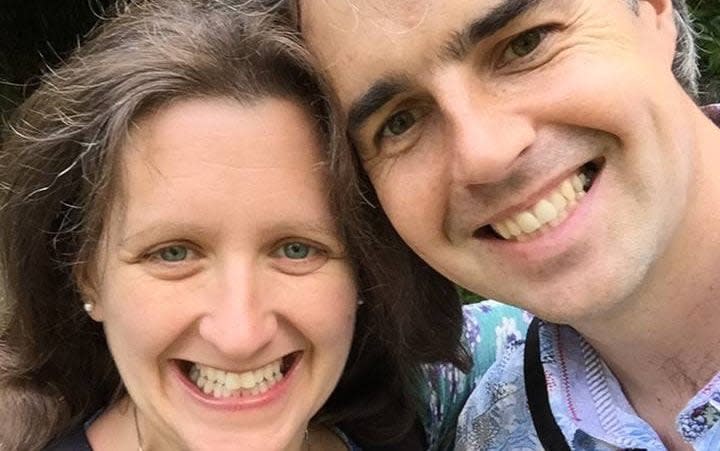‘It’s like King Lear’: Daughter fights mum and siblings in High Court in inheritance row

An accountant who quit her job to take on the family’s glamping business is suing her mother in an inheritance row.
Angela Heyes, 48, and engineer husband Neil, 46, claim they left their high-flying lives in Surrey behind in 2014 to move to Cornwall on the promise that they would inherit Mrs Heyes’s parents’ farm, which doubles up as a glamping business with on-site yurt.
But following the death of her dad Patrick Holt, a pilot, in 2020, the couple are now fighting a High Court battle with her mother, Sarah Holt, over who owns the family holding, near Truro.
The couple claim they only moved to Cornwall, leaving behind their good jobs and lives in the South East, on the back of promises by both of Angela’s parents that they would inherit the farm.
But Mrs Holt – backed by her other children – is fighting the claim in a battle that could cost the family about £1 million in lawyers’ bills.
The unusual family feud was compared to Shakespeare’s King Lear by Judge Paul Matthews, who told a High Court pre-trial hearing: “The proceedings are between a daughter and her husband on the one side, and her mother and her father’s estate, supported by the daughter’s two siblings, on the other.
“It is a tragedy for all concerned. This is not only because it splits a family, pitting a parent and two children against another child in a dispute about family property, like a modern-day King Lear.”
King Lear, written by Shakespeare in the early 17th century tells the story of a king of ancient Britain who divides his kingdom between his daughters, with tragic consequences.

The court heard that the farm, owned by Ms Heyes’s parents, included a substantial house, cottage, gardens and fields.
Angela and husband Neil claim that, in 2013, while visiting her parents in Cornwall, there had been a conversation about the future of the 60-plus acre site.
She said: “After that formal conversation, Neil and I, together with our two young children… abandoned our plans in the Guildford area and arranged to move to Cornwall at the end of July 2014.
“We bought a house right next to the farm, and Neil gave up his job and has worked on the farm since September 2015.”
Having settled in Cornwall, Angela quit her job with professional services company Accenture in 2019 and took a local job “at a reduced salary of £75,000 per annum,” she said, as well as roles as a Girl Guides Leader and school governor in her adopted home county.
Her husband, Neil, works full time on the farm, which includes a livery business and glamping site with a 22ft yurt, in the village of Devoran, near Truro.
Angela told the judge that promises by her mother and father about she and Neil getting the farm were given repeatedly and voluntarily.
“I would not have moved down to Cornwall with my family if I thought that this was not the case,” she said.
The couple are now suing Angela’s mum personally and as executrix of her dad’s estate, claiming that the land is theirs because of the alleged promises made, under the legal concept of “proprietary estoppel.”
But Mrs Holt is fighting the claim, pointing to the fact that Angela has siblings, sister Jennifer and half-brother Justin, who is Mrs Holt’s son from a previous relationship.
She told the court that any assurances made to her daughter and son-in-law were “too uncertain in extent” to give them a good claim to the entirety of the land.
It was also clear that both Angela and Neil knew that no “sufficiently clear assurances” had been given or were intended to be relied upon.
Despite its value because of the potential for development, the farmland is not large and cannot itself support a family, Mrs Holt’s lawyers said.
The late Mr Holt had not been a full-time farmer there, instead working as a pilot, which enabled him to keep the farm going.
‘Another life’
Mrs Holt also said that her daughter Angela, the main breadwinner in her marriage, had not quit her well-paid job until 2019, adding that she “had another life” and her daughter had “chosen to give it up”.
Discussions about their future at the farm were always provisional, she said, given the need to take account of what they might inherit, how much they might have to pay to Angela’s siblings and the possibility Mr and Mrs Holt might need their assets to pay for care home fees.
The case reached court last month after an application by Mrs Holt for “reverse summary judgment”, effectively ending her daughter and son-in-law’s claim without it getting to trial.
Giving judgment last week, Judge Matthews said the couple’s case was “weak” but rejected Mrs Holt’s application ruling that it would be a matter for a judge at a full trial.
“The resolution of this dispute will require the court to consider all the evidence, including in particular the cross-examination of the various witnesses upon their witness statements,” he said.
“On all the material before me, my conclusion on the application for summary judgment is that, although the case is weak, it is not so weak that I can say it has only a fanciful or theoretical prospect of success.
“Accordingly, I cannot grant summary judgment.”
The judge ordered the competing parties to try to settle their differences outside court, pointing out that the case would “ruin” Angela and Neil if it went to trial and they lost.

